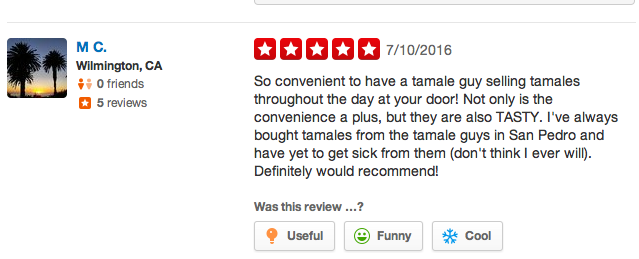See the guy with the tamales in the hot box on wheels? He’s well-known in San Pedro, home of the Port of Los Angeles, on the south side of the City of Angels. This vato — The Tamale Guy — even has his own reviews (good ones!) on Yelp:
Legalizing street vendors like the Tamale Guy is one of the key elements of the Manifesto of The Taco Truck Party, announced on POCHO last week by our Associate Naranjero Gustavo ¡Ask a Mexican! Arellano.
Via our friends at LatinoLA.com, here’s an academic analysis of the issues involved:
Why the City of Los Angeles Should Legalize Street Vending
Street entrepreneurs should not be criminalized
By Vanessa Alcantar and Robert D. Flores Jr.
“¡Tamales! ¡Tamales! ¡Tamales!”
Growing up in the East L.A. and Pico Union neighborhoods of Los Angeles, this shouting is something everybody in the neighborhood is accustomed to because it provides a sense of home. To everyone in our households, this is the cue to scour through the house for cash and hurry outside to catch the tamale lady in time before she takes off.
Similarly, in the Pico Union neighborhood, an occurrence transcends with the jingle of “La Cucaracha,” where a Latino in his late 50’s drives in his small commercial truck, selling fresh produce, snacks, and other household necessities. In minutes, he attracts a crowd of interested customers, purchasing their daily goods. Since many residents in these low-income, Latino neighborhoods don’t own a car, they benefit from these type of street vendors.
Minority groups have always been segregated in the United States in one way or another. Specifically, undocumented immigrants who are discriminated for not having proper citizenship status. Due to the legality issues, these undocumented workers have to seek work outside the formal economy in order to support themselves and their families.
Street vending represents a viable solution for Latino immigrants and others in the City of Los Angeles. Street vending has been embedded in the street culture of Los Angeles and become a social norm due to the peculiarity of using store carts, horns, and Mexican jingles. Additionally, the variety of foods and products from different parts of Mexico and Central America have provided a piece of culture, diversifying the city.
For some residents, the shouting, the jingles, the bicycle horn blowing, the order in which all products are displayed on sidewalks represent a nuisance and/or visualized as aesthetically unpleasing. For city officials, this act is seen as illegal. But why is this the case? Why do policy makers view these street vendors as lawbreaking criminals? Instead, policymakers should view them as petty-entrepreneurs, trying to make an honest living?
A hardworking individual selling hot food, leather goods, toys, or fresh produce is not a criminal. Their work is licit and low income communities of color rely on their goods. They are not to be marginalized and trialed on the same level as drug dealers. As planners we propose the City of Los Angeles to work with Nonprofit organizations, academic institutions, stakeholders, and street vendor to legitimize their work.
Various stakeholders hold legitimate concerns about the possibility of the legalization of street vending. However, a lot of the opposition to the legalization is often based on misinformation. For example, claims that vending will harm local businesses are often unsubstantiated. In fact, businesses located near vendors are actually more likely to experience job growth and maintain higher levels of employment than businesses not located near vending (1). Additionally, regulated sidewalk vending will benefit local businesses by increasing foot traffic and stimulating economic activity along commercial corridors.
A more important benefit however, are the economic impacts street vending will provide to the local economy. In addition to direct revenue from annual permit fees, every $1 earned by a food vendor generates an additional $1.58 in economic activity which could result in an additional $43 million annually in state and local tax revenue (2). Street vending also provides more than 5,000 jobs in the city.
We witnessed first hand, by interviewing two street vendors, a glimpse of their work and documented their struggles, both migrated from Puebla, Mexico. The first vendor, El Señor de los Mangos we interviewed, sold mangoes, chips, etc. and has been vending for 25 years. He lives in East Los Angeles, works 7 days a week, and relies on the help from his son. Per request he caters hot foods like tamales and Mexican hot chocolate, and says he has to offer a variety of foods to make enough money. Certain days he makes less than $100; compared to the cost of living in Los Angeles it is nothing.
The second vendor, (El Elotero) we interviewed, also from East Los Angeles, sold primarily corn. He compares his vending profits, as low as his wages in Puebla, Mexico as a farmer. He has to work 7 days a week, 8-10 hour days. He has to resort to dumpster diving for cans and bottles in order to make extra money. Additionally, he faces perilous situations such as robbery from gang members that is unfortunately commonplace for street vendors and small business owners.
These stories aren’t glamorous and joyous; they are the raw reality of the lives these individuals live. Academic institutions and nonprofits should showcase the work of Street Vendors. Cal Poly Pomona’s Department of Urban and Regional Planning has initiated the visibility for this issue by hosting a Street Vending Symposium in which El Señor de los Mangos was invited to speak about his experiences. But this isn’t enough. More needs to be done to shed light on the harsh realities these street vendors face.
It is time for Los Angeles city officials to take a humane stance on this issue. Los Angeles is the last of the major cities in the United States to have a ban on street vending. Legalizing street vending via a permit system would provide much needed revenue to the city, jobs, food for low-income residents, and stimulate local businesses. Additionally, it would protect workers from confiscation of their property by law enforcement as well as theft from gang members.
The City of Los Angeles needs to end the criminalization of street entrepreneurs. Political discourse in this country preaches the old homage, “pull yourself up from your bootstraps,” yet these entrepreneurs who have done just that are ostracized, demonized, and criminalized. It is time to end this hypocrisy of the bourgeois politics in the City of Los Angeles, and give them the dignity, protection, and opportunity they deserve.
Footnotes:
1 Economic Roundtable, “Impact of Street Vendors on Brick and Mortars,” March, 2015.
2 Economic Roundtable, “Economic Impacts of Los Angeles Street Vendors,” Dec. 2, 2014.
About Vanessa Alcantar and Robert D. Flores Jr.:
Vanessa and Robert, who grew up in the Pico Union and East Los Angeles neighborhoods respectively, are graduate students at California Polytechnic University, Pomona in the Department of Urban & Regional Planning.
::::::::::::::::::::::::
Want to get deeper? Cal Poly Pomona shared an hour-long video of their symposium on the issue:
The Department of Urban and Regional Planning (URP) at Cal Poly Pomona hosted a symposium (1-hour) on street vending on May 19, 2016. Organized by Dr. Alvaro Huerta and his urban planning graduate students, in association with co-sponsors, this educational symposium focused on a key question: “Should the City of Los Angeles Legalize Street Vending?”
The speakers discussed the informal economy, plight of street vending and organizing efforts by The Los Angeles Street Vendors Campaign (http://www.streetvendorsforla.org).
Speakers:
Dr. Alvaro Huerta, assistant professor of City & Regional Planning and Ethnic and Women’s Studies at California State Polytechnic University, Pomona (or Cal Poly Pomona)
Doug Scott, public interest attorney for Public Council
Cerafine Zavala, street vendor
Co-sponsors:
Ethnic and Women’s Studies Department
American Planning Student Association
Graduate Planning Students Association
URBAN-Los Angeles

